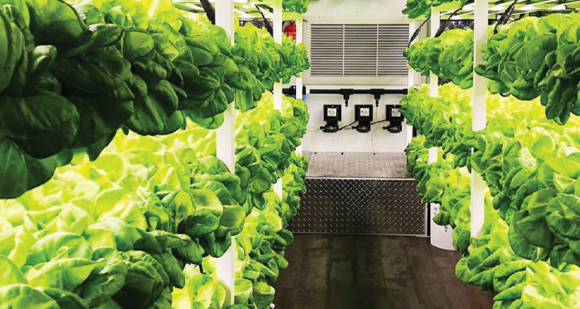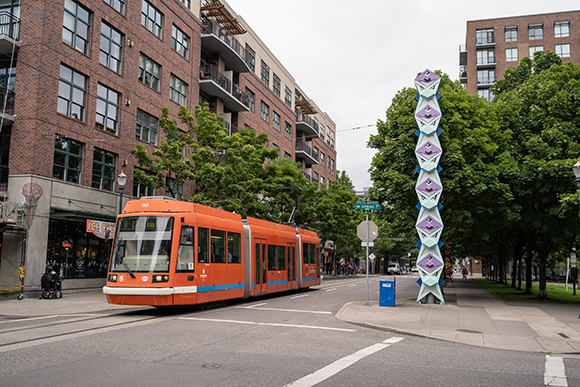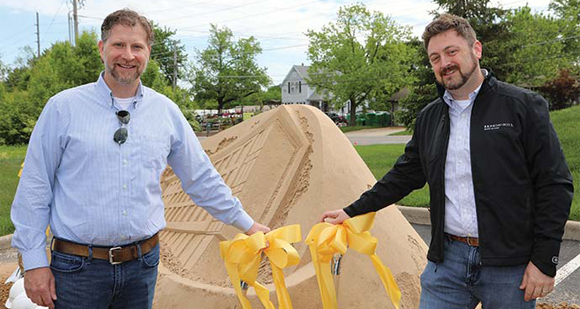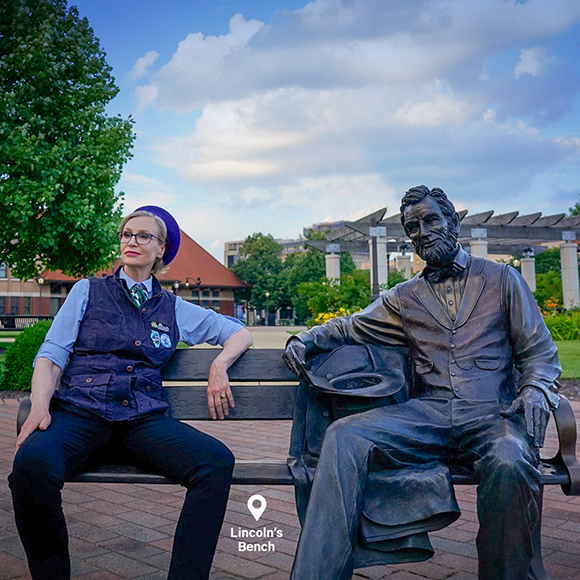|



|
FROM SITE SELECTION
MAGAZINE, JULY 2022 ISSUE
|

|
FOOD & BEVERAGE
In the innovative world of food & drink startups, a coastal town is
making waves.
|
|

|
NEWS DIGEST
Lego lands in Virginia; Seqirus expands in North Carolina; CBRE names
its top 25 life sciences talent markets; Stellantis bets on Great Lakes
locations; Novelis picks the South Alabama Mega Site; and Caterpillar
becomes the 54th Fortune 500 company to move its HQ to Texas.
|
|
  |

|
A streetcar moves through the Pearl District in Portland,
Oregon.
Photo by Justin Katigbak courtesy of Travel
Portland
|
|
According to the American Public Transportation Association
(APTA), nearly half of the urbanized areas leading the country in
transit ridership per capita (see chart) are college towns. They include
Ames and Iowa City, Iowa; Champaign, Illinois; Boulder, Colorado; Ann
Arbor, Michigan; Davis, California; and State College, Pennsylvania.
That figures, given the propensity of students for riding buses around
campus and around town.
The balance of those top metros (as of 2019, pre-COVID) are urban areas
whose urban rail and bus systems go back a century or more: New York;
San Francisco; Boston; Washington, D.C.; Chicago. Citizens grow up not
ever needing or wanting a driver’s license. Hopping onto a bus or taking
the stairs to a rail stop come as natural as eating, walking and
breathing.
But what about the leaders whose populations are neither huge nor
predominantly matriculating? They must be doing something innovative in
terms of connectivity and transit-oriented development to garner all
those rides.
Among the top ridership-per-capita metros, the communities that fit that
description — nothwithstanding their prominent higher education
institutions — include No. 9 Seattle (more than 71 rides per 1,000
residents); No. 15 Portland, Oregon (nearly 60 rides per
1,000 residents); metro Denver and Bellingham, Washington (41
rides); and Pittsburgh, Pennsylvania (38 rides) — a location where even Zoom itself chose to physically locate two
years ago. -Adam Bruns
| URBANIZED AREA |
POPULATION (2010 CENSUS) |
2019 UNLINKED PASSENGER TRIPS (THOUSANDS) |
RIDERSHIP PER CAPITA (PER 1K POP.) |
| New York-Newark, NY-NJ-CT |
18,351,295 |
4,209,297.9 |
229.4 |
| San Francisco-Oakland, CA |
3,281,212 |
406,960.7 |
124 |
| Ames, IA |
60,438 |
6,121.0 |
101.3 |
| Washington, DC-VA-MD |
4,586,770 |
419,224.3 |
91.4 |
| Boston, MA-NH-RI |
4,181,019 |
376,391 |
90.0 |
| Champaign, IL |
145,361 |
11,637.3 |
80.1 |
| Urban Honolulu, HI |
802,459 |
63,372.8 |
79.0 |
| State College, PA |
87,454 |
6,602.8 |
75.5 |
| Seattle, WA |
3,059,393 |
217,909.2 |
71.2 |
| Chicago, IL-IN |
8,608,208 |
553,155.6 |
64.3 |
| Philadelphia, PA-NJ-DE-MD |
5,441,567 |
347,457.4 |
63.9 |
| Ithaca, NY |
53,661 |
3,334.7 |
62.1 |
| Portland, OR-WA |
1,849,898 |
110,112.6 |
59.5 |
| San Marcos, TX |
52,826 |
3,047.1 |
57.7 |
| Atlantic City, NJ |
248,402 |
14,225.3 |
57.3 |
| Athens-Clarke County, GA |
128,754 |
7,272.2 |
56.5 |
| Blacksburg, VA |
88,542 |
4,975.5 |
56.2 |
| Boulder, CO |
114,591 |
6,213.9 |
54.2 |
| Davis, CA |
72,794 |
3,904.1 |
53.6 |
| Concord, CA |
615,968 |
32,879.5 |
53.4 |
| Iowa City, IA |
106,621 |
5,513.1 |
51.7 |
| Gainesville, FL |
187,781 |
9,025.4 |
48.1 |
| Ann Arbor, MI |
306,022 |
14,352.3 |
46.9 |
| Waterbury, CT |
194,535 |
9,120.5 |
46.9 |
| Danbury, CT-NY |
168,136 |
7,613.8 |
45.3 |
Source: APTA
|
|
|
2022 MISSISSIPPI
DEVELOPMENT GUIDE
|

|
STATISTICAL PROFILE
Check out the latest data on Mississippi projects, innovation and
tourism.
|
|
New York
As reported in May, this Brooklyn home base is one of two major offices
that creative agency Huge, part of Interpublic Group of Companies, is
redefining as “experience centers” as it reassesses its physical
location footprint. Smaller offices of between 50 and 150 staff will
gradually be phased out, said Huge Global CEO Mat Baxter, with employees
given membership access to co-working spaces in those locations. The
other location transitioning to a clubhouse-like “experience center” is
in Medellín, Colombia, a location Site Selection’s Adam Bruns visited in
2015 and wrote about in “This is a Huge story.” Read this Ad Age article for an in-depth discussion
with Baxter about Huge’s approach to the hybrid workforce.
Ontario
Sanofi in June announced the opening of an Artificial Intelligence
Centre of Excellence in downtown Toronto, joining Sanofi’s global
network of existing digital hubs in Paris, Boston, New York and
Barcelona. Identifying the city as having “one of the world’s premier AI
and data ecosystems,” Sanofi Global Chief Data Officer Joyce Drohan
said, “By attracting top AI talent and partnering with leading academic
and research institutions locally, we will further our global commitment
to addressing healthcare’s biggest challenges and improving the lives of
patients. We are the only multi-national pharmaceutical company with a
global digital hub that services the world from right here in Toronto.”
The Honourable François-Philippe Champagne, minister of Innovation,
Science and Industry of Canada, said the project “has further
underscored the success of our Pan-Canadian AI Strategy in attracting
and retaining experts and leaders in artificial intelligence. The
announcement also builds on our government’s partnership with Sanofi
with the recently announced $900 million end-to-end vaccine
manufacturing facility in Toronto.” The global company employs around
2,000 people in Canada, and in 2021 announced an investment of C$925
million in the new vaccine manufacturing facility at its existing
Toronto site.
|
|
 
|
|
SITE SELECTION
RECOMMENDS
|

|
Benson Hill co-founders Todd Mockler (left) and Matt Crisp have watched
their company blossom since planting their HQ at the Danforth Plant
Science Center in 2019.
Photo courtesy of Benson Hill
|
|
Two bits of news this month are cause for some Site
Selection callbacks. First, building on a growing financial services profile in
Florida and in its hometown of Jacksonville,
Jacksonville University’s Davis College of Business &
Technology announced it is now offering two fintech programs
in its BBA and MBA degree programs. “Jacksonville is a
burgeoning FinTech city, and as more companies move to the
city and expand their operations across the country, there’s
truly no better time to be launching this program for our
students,” said Jacksonville University Provost and Senior
Vice President of Academic Affairs Dr. Christine Sapienza.
Meanwhile, earlier this week, St. Louis–based food tech
company Benson Hill announced a long-term strategic
licensing partnership with global company ADM to “scale
innovative soy ingredients that will help meet the rapidly
growing demand for plant-based proteins.” “We’re excited to
launch this collaboration with Benson Hill, building full
seed-to-fork capabilities with cutting-edge technologies
that will allow us to offer new, innovative products to our
alternative protein customers,” said Leticia Gonçalves,
ADM’s president of Global Foods. “The global trends of food
security and sustainability are driving significant and
ongoing demand growth for alternative proteins: Alternative
meat and dairy sales alone are expected to grow 14% a year,
reaching $125 billion by 2030. ADM has expanded global
capacity to meet that demand with the acquisition of
Sojaprotein and the recently announced investment to enhance
processing and supply capabilities and build a new protein
solutions innovation center in Decatur, Illinois,” located
2. 5 hours’ drive northeast of Benson Hill’s home base in
metro St. Louis. “This partnership with ADM represents a
major milestone in advancing our business to its next stage
of growth, “said Benson Hill CEO Matt Crisp, “which also
will serve to broaden our proprietary product portfolio and
drive significant scale of ingredients derived from Benson
Hill genetics.” Site Selection has followed the growth of
Benson Hill over several years, beginning with this 2019 profile, and including this follow-up conversation with Matt
Crisp last year.
|
|
|

|
Photo courtesy of Illinois Office of
Tourism
|
|
Actor, producer and writer Jane Lynch shows she can manspread with the
best of them in this image made in Springfield, Illinois, as part of the
state’s new “Middle of Everything” tourism campaign, which she directed.
The daughter of Chicago’s southwest suburbs honed her craft in Chicago’s
theater and comedy scene and earned a degree from Illinois State
University in Bloomington-Normal. Lincoln’s bench is a life-size
reproduction of Colorado artist Mark Lundeen’s smaller piece, donated to
the Abraham Lincoln Presidential Library and Museum in Springfield by
Siciliano Construction Company President Rick Lawrence in honor of the
Siciliano workers who built the museum and library.
|
|
|
|

